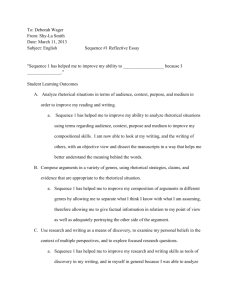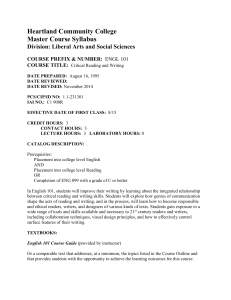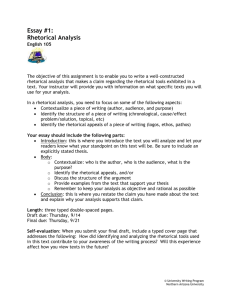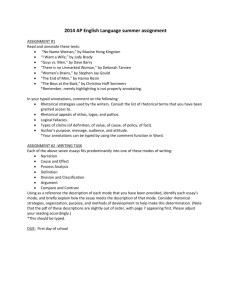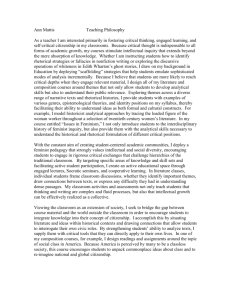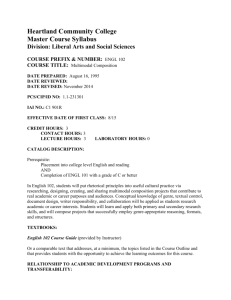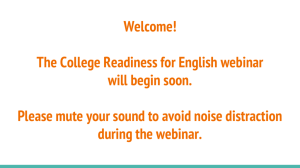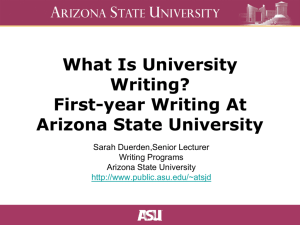ENG 1121 - New York City College of Technology
advertisement
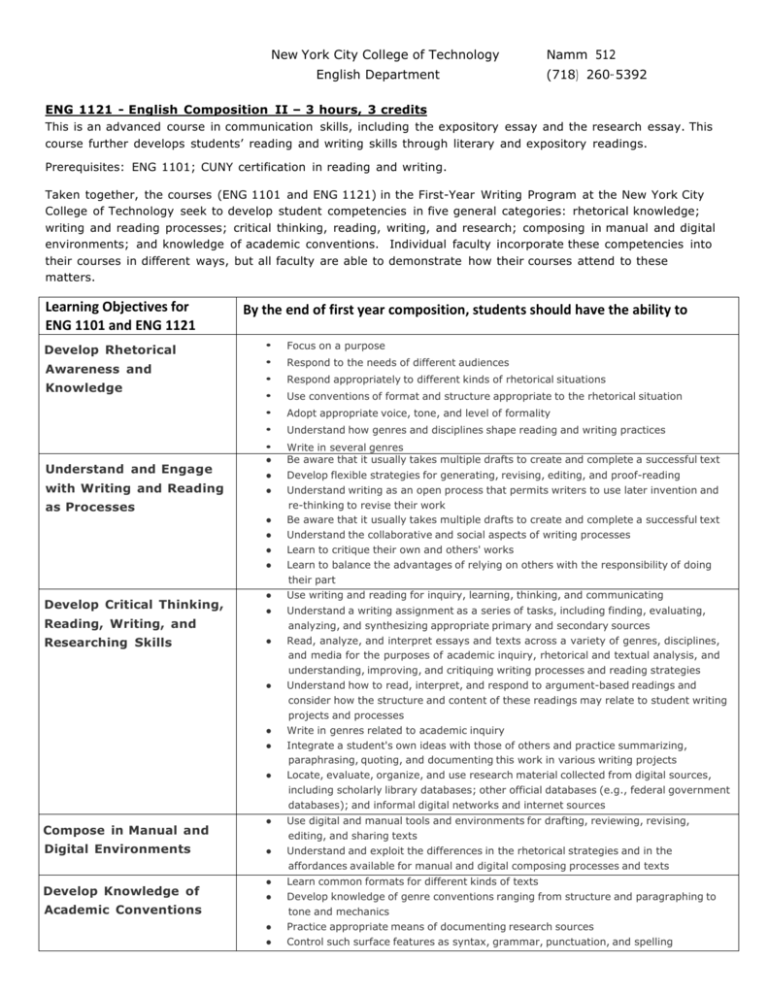
New York City College of Technology English Department Namm 512 (718) 260-- 5392 ENG 1121 - English Composition II – 3 hours, 3 credits This is an advanced course in communication skills, including the expository essay and the research essay. This course further develops students’ reading and writing skills through literary and expository readings. Prerequisites: ENG 1101; CUNY certification in reading and writing. Taken together, the courses (ENG 1101 and ENG 1121) in the First-Year Writing Program at the New York City College of Technology seek to develop student competencies in five general categories: rhetorical knowledge; writing and reading processes; critical thinking, reading, writing, and research; composing in manual and digital environments; and knowledge of academic conventions. Individual faculty incorporate these competencies into their courses in different ways, but all faculty are able to demonstrate how their courses attend to these matters. Learning Objectives for ENG 1101 and ENG 1121 Develop Rhetorical Awareness and Knowledge Understand and Engage with Writing and Reading as Processes Develop Critical Thinking, Reading, Writing, and Researching Skills By the end of first year composition, students should have the ability to • • • • • • • Focus on a purpose ● ● Develop flexible strategies for generating, revising, editing, and proof-reading Understand writing as an open process that permits writers to use later invention and re-thinking to revise their work Be aware that it usually takes multiple drafts to create and complete a successful text ● ● Academic Conventions Adopt appropriate voice, tone, and level of formality Understand how genres and disciplines shape reading and writing practices Write in several genres Be aware that it usually takes multiple drafts to create and complete a successful text ● Use writing and reading for inquiry, learning, thinking, and communicating ● Understand a writing assignment as a series of tasks, including finding, evaluating, analyzing, and synthesizing appropriate primary and secondary sources Read, analyze, and interpret essays and texts across a variety of genres, disciplines, and media for the purposes of academic inquiry, rhetorical and textual analysis, and understanding, improving, and critiquing writing processes and reading strategies Understand how to read, interpret, and respond to argument-based readings and consider how the structure and content of these readings may relate to student writing projects and processes ● ● Develop Knowledge of Use conventions of format and structure appropriate to the rhetorical situation Understand the collaborative and social aspects of writing processes Learn to critique their own and others' works Learn to balance the advantages of relying on others with the responsibility of doing their part ● ● Digital Environments Respond appropriately to different kinds of rhetorical situations ● ● ● ● Compose in Manual and Respond to the needs of different audiences Write in genres related to academic inquiry Integrate a student's own ideas with those of others and practice summarizing, paraphrasing, quoting, and documenting this work in various writing projects Locate, evaluate, organize, and use research material collected from digital sources, including scholarly library databases; other official databases (e.g., federal government databases); and informal digital networks and internet sources ● Use digital and manual tools and environments for drafting, reviewing, revising, ● editing, and sharing texts Understand and exploit the differences in the rhetorical strategies and in the affordances available for manual and digital composing processes and texts ● Learn common formats for different kinds of texts ● Develop knowledge of genre conventions ranging from structure and paragraphing to tone and mechanics ● ● Practice appropriate means of documenting research sources Control such surface features as syntax, grammar, punctuation, and spelling It is expected that, at a minimum, students in ENG 1121 will: • • • • • Read and listen critically and analytically, including identifying an argument's major assumptions and assertions and evaluating its supporting evidence. Write clearly and coherently in varied, academic formats (such as formal essays, research papers, and reports) using standard English and appropriate technology to critique and improve one's own and others' texts. Demonstrate research skills using appropriate technology, including gathering, evaluating, and synthesizing primary and secondary sources. Support a thesis with well-reasoned arguments, and communicate persuasively across a variety of contexts, purposes, audiences, and media. Formulate original ideas and relate them to the ideas of others by employing the conventions of ethical attribution and citation. And that these outcomes will be achieved by giving students the opportunity to: 1. Draft and revise a range of formal and informal writing assignments and writing projects both in-class and outside-of-class in a variety of genres and modes to meet appropriate rhetorical purposes related to discipline-specific academic inquiry, totaling, at a minimum, 1500 words. Two or more of these assignments or projects must include the use of thesis statements and incorporate the ideas and words of other writers using textual evidence, summarizing, paraphrasing, and quoting. 2. Draft and revise a research project that may include a proposal, annotated bibliography, source overview, and research paper. The research project will total, at a minimum, 1500-2000 words and will incorporate material from library resources and databases and will include the use of methods of citation and attribution appropriate to a specific discipline. 3. Understand how to read, interpret, and respond to literary or other discipline specific and argument-based readings for the purposes of academic inquiry, rhetorical and textual analysis, and understanding, improving, and critiquing writing processes and reading strategies. 4. Submit drafts of work for instructor and peer-review so students can be introduced to the various stages of writing and revising as a process, as well as be assessed on their ability to develop and revise formal writing assignments. 5. Understand how to apply and use the basic structure and conventions of Standard Written English (SWE) and exhibit basic competency in SWE. 6. Pass a departmental final exam. 2
